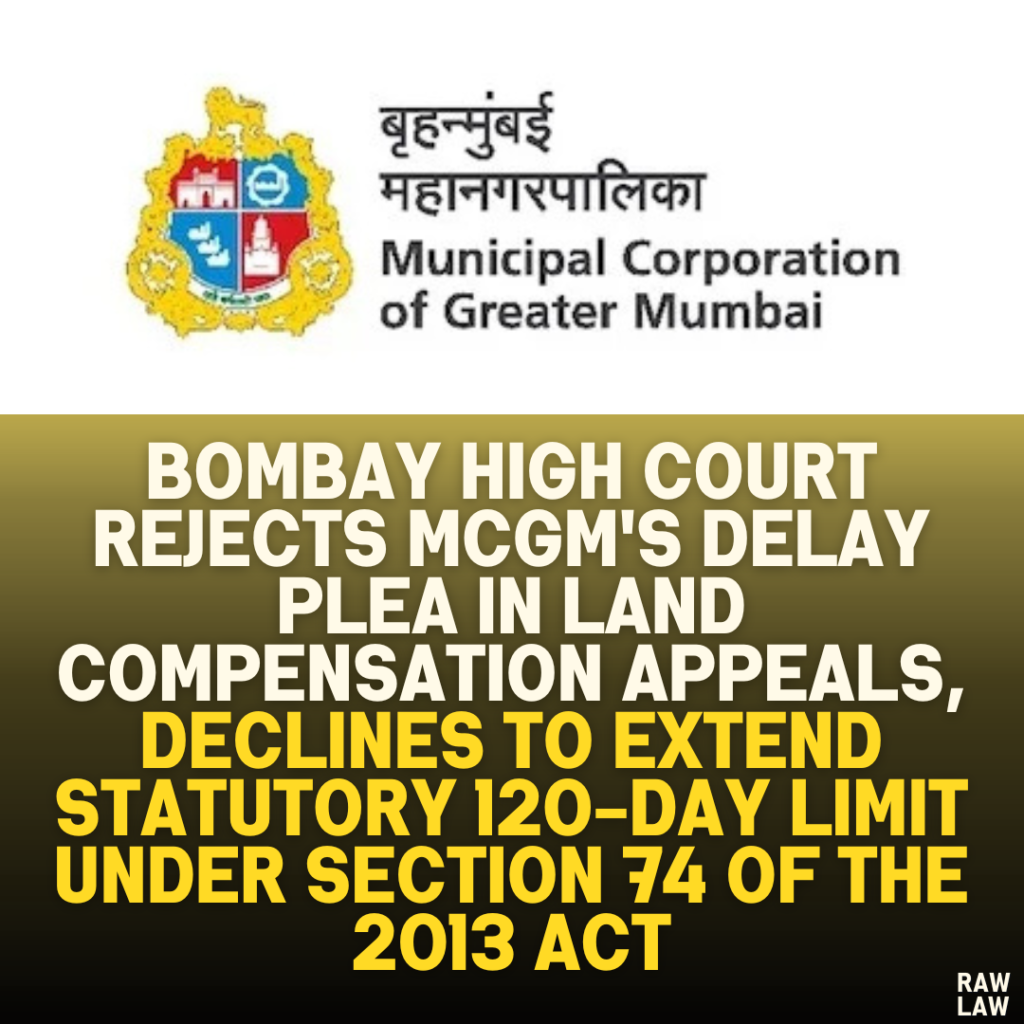Court’s Decision:
The Bombay High Court dismissed the Municipal Corporation of Greater Mumbai’s (MCGM) applications for condonation of delay in filing appeals under Section 74 of the Right to Fair Compensation and Transparency in Land Acquisition, Rehabilitation and Resettlement Act, 2013 (“2013 Act”). The Court ruled that it lacked the jurisdiction to condone delays beyond the 120-day period prescribed by Section 74(1) of the 2013 Act and its proviso.
Facts:
- The MCGM challenged two awards dated February 13, 2024, passed by the Reference Authority, which had enhanced compensation for land acquisition under the 2013 Act.
- The limitation period for filing appeals under Section 74 of the 2013 Act is 60 days, extendable by a further 60 days if sufficient cause is shown.
- The MCGM filed appeals:
- First Appeal on August 21, 2024, delayed by 128 days.
- Second Appeal on September 6, 2024, delayed by 144 days.
- The MCGM sought condonation of delay, attributing the delays to administrative hurdles.
Issues:
- Jurisdictional Question: Can the High Court condone delays exceeding 120 days under Section 74(1) of the 2013 Act?
- Applicability of the Limitation Act: Does Section 5 of the Limitation Act, 1963, allow condonation of delays under Section 74 of the 2013 Act, given the absence of explicit exclusion?
Petitioner’s Arguments:
- General Law Argument: The 2013 Act is a general law, and hence Section 5 of the Limitation Act applies.
- Express Exclusion Argument: Section 74 does not explicitly exclude Section 5 of the Limitation Act. Therefore, the delay should be condoned beyond 120 days.
- Beneficial Legislation: The 2013 Act is a beneficial statute designed to address public needs, and its provisions should be interpreted liberally.
- Precedent Support:
- Relied on cases where courts applied Section 5 of the Limitation Act in special legislation.
Respondent’s Arguments:
- Strict Timeframe: Section 74(1) explicitly provides for a maximum period of 120 days for filing appeals, and any delay beyond this is not condonable.
- Legislative Intent: The 2013 Act aims for the expeditious resolution of disputes, which is undermined by condoning delays beyond the statutory limit.
- Proviso Language: The use of the words “not exceeding sixty days” in the proviso to Section 74(1) constitutes an express exclusion of Section 5 of the Limitation Act.
Analysis of the Law:
The Court examined:
- Section 74 of the 2013 Act:
- Appeals must be filed within 60 days, extendable by a further 60 days if sufficient cause is shown.
- Beyond 120 days, no extension is permitted.
- Section 5 of the Limitation Act:
- Allows condonation of delay for sufficient cause unless expressly excluded by a special statute.
- Section 29(2) of the Limitation Act:
- Makes Sections 4 to 24 of the Limitation Act applicable to special laws unless expressly excluded.
Precedent Analysis:
The Court referred to leading judgments:
- Union of India v. Popular Construction Company (2001):
- Held that where a statute uses language like “not thereafter,” it excludes Section 5 of the Limitation Act.
- Chhattisgarh State Electricity Board v. Central Electricity Regulatory Commission (2010):
- Confirmed that special statutes with strict timelines exclude the Limitation Act’s general provisions.
- Kaushalya Rani v. Gopal Singh (1964):
- Distinguished between general and special laws, emphasizing that express exclusions need not be explicit but can be inferred from the statute’s language.
Court’s Reasoning:
- Nature of Section 74:
- The 2013 Act, though a general statute for land acquisition, creates a special law on limitation with a strict timeframe for appeals under Section 74.
- Express Exclusion:
- The proviso to Section 74(1) states that appeals can only be entertained within a further period of 60 days, explicitly barring condonation beyond 120 days.
- Applying Section 5 of the Limitation Act would render the proviso otiose, violating principles of statutory interpretation.
- Legislative Intent:
- The legislature deliberately restricted the appellate period to ensure expeditious resolution of land acquisition disputes.
- Precedential Support:
- Cases like Popular Construction and Chhattisgarh Electricity Board affirm that similar language in other statutes excludes the application of Section 5 of the Limitation Act.
Conclusion:
The Court held that:
- The High Court has no power to condone delays beyond 120 days under Section 74(1) of the 2013 Act.
- The language of the proviso constitutes an express exclusion of Section 5 of the Limitation Act.
Resultantly, the interim applications for condonation of delay were dismissed.
Implications:
- Strict Adherence to Timelines:
- The judgment underscores the judiciary’s commitment to respecting statutory deadlines, particularly in time-sensitive matters like land acquisition.
- Legislative Clarity:
- Reinforces the principle that legislative intent and statutory language dictate procedural boundaries.
- Impact on Land Acquisition:
- Encourages timely filing of appeals, ensuring certainty and finality in land acquisition disputes.
